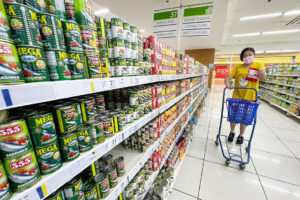Low rate of plastic recycling seen as a missed opportunity

THE PROPORTION of plastics that are recycled in the Philippines is about 30%, with the unrecycled materials that go to waste valued at around $1 billion, the International Finance Corp. (IFC) said.
IFC Country Manager Jean-Marc Abrogast said deterrents to recycling include high power costs and cheap landfill disposal fees.
“We estimate that to be around $1 billion every year of value that goes to waste,” he said at the BusinessWorld Virtual Economic Forum Wednesday.
He said more global brands have voluntarily committed to using recycled resins in their products, increasing demand.
But in the Philippines, recycled material suppliers are small- and medium-sized businesses that cannot scale up their operations to meet the needs of global companies, pushing the brands to choose virgin plastic made from crude oil or natural gas.
“The decision here also becomes economic. You have competition from virgin materials, virgin plastic. So if the oil price is low, for example, the decision is very quick, unfortunately. You’ll go with the lower cost,” Mr. Abrogast said.
Tipping fees, or waste disposal charges, are also cheap in the Philippines compared to other Asian countries, which means there is little incentive for local government units or private companies to invest in waste management.
“The fees are so low, it’s very hard to come in and make (recycling) profitable,” he said.
“Electricity costs are very high in the Philippines, among the highest in the region. So if you’re running a facility, whether it’s a mechanical recycling facility or chemical recycling facility, it’s very expensive.”
Over 60% of products sold in the Philippines, he added, use packaging that is hard to recycle. — Jenina P. Ibanez
“If we’re able to put in place some regulation or standard that would mandate companies to look at those packaging in a different way, I think it would help a lot.”
He said the government should require companies to have a percentage of recycled material in their packaging and products. Packaging can also be made easier to recycle by limiting the coloring and types of resin, he added.
“In the end, if we really want to make a change, it has to come from the consumers. If the consumers are not there, it won’t happen. If the consumers all together want something, the market’s going to respond to it.”
The House of Representatives in July approved on final reading House Bill No. 9147 or the Single-Use Plastic Products Regulation Act, which would stop the production and sale of single-use plastics. The counterpart measure is still pending at the Senate.
Coca-Cola Philippines in September announced it would phase out its sachet production by next year. — Jenina P. Ibanez




